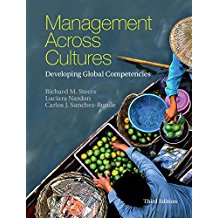 Authors: Richard M. Steers, Luciara Nardon, and Carlos J. Sanchez-Runde
Authors: Richard M. Steers, Luciara Nardon, and Carlos J. Sanchez-Runde
Publisher: Cambridge University Press – 405 pages
Book Review by: Sonu Chandiram
As companies in many countries including notably in North America, Europe, and Asia (particularly in China and India) establish branches and regional headquarters in many parts of the world seeking to increase their revenues and profits from new markets, they face many communication, cultural, political and other types of challenges that hamper smooth functioning.
They are well aware that they cannot expect to do business in other countries in the same ways they do business at home. This book has been developed to provide the information and understanding necessary for managers to deal with people of different cultures, in order to have successful outcomes.
Written by professors of international business at universities in Canada, Spain and the United States, this work fills many gaps relating to diverse business environments, peoples’ expectations and motivational levels, and much more.
This is an important book for students taking courses on international management and for those in executive-training programs. It consists of twelve chapters named below to give you an overview of its contents:
- Management Across Cultures: An Introduction
- Global managers: challenges and responsibilities
- Cultural environments
- Organizational environments
- Communicating across cultures
- Leading global organizations
- Negotiating global partnerships
- Managing ethical conflicts
- Managing work and motivation
- Managing global teams
- Managing global assignments
- Lessons learned
This third (2016) edition of Management Across Cultures – Developing Global Competencies has been revised and updatedto
- Explore the latest approaches to cross-cultural management
- Present strategies and tactics for managing international assignments and global teams
- Introduce a global management model
- Unveil enhanced “applications” and “manager’s notebooks” to acquire multicultural competence that will be highly regarded by future employers
- Impart skills that have never been as important as now, in a world where increasingly, all managers are global managers and where management practices and processes can differ significantly across national and regional boundaries.
The authors write that for companies to succeed in the global economy, their executives need to be aware that they have to have a number of important ingredients, including:
- Innovative ideas and products
- Access to raw materials and competitive labor
- Savvy marketing strategies
- Solid financing
- Sustainable supply chains
- Predictable logistical support
But what is essential for a company to achieve success overseas is the presence of managers who clearly understand the imperative of having the above-named resources and the knowledge and skills to deploy them in
Besides the above, global managers need to have a thorough understanding of accounting and finance, microeconomics and macroeconomics, and other fundamental business practices such as logistics, operations, and people skills particularly, in dealing successfully with people of many nationalities.
Global managers in particular must also understand the pros and cons of outsourcing, political risks, international law, and the legal limitations within it, the authors point out in the Preface.
They write that the most important element however, for companies to grow their international business, is for their global managers to be able to understand and motivate people of varied cultural backgrounds to get their jobs done well. This will enable them to reach overseas revenue and profit targets and achieve a company’s international goals.
This is an excellent work on the how-to of developing multicultural competence, which is a critical factor for companies to succeed on the global stage. Its chapters spell out the necessary pertinent details.
Authors:
Richard M. Steers is Professor Emeritus of Organization and Management at the Lundquest College of Business at the University of Oregon in the United States.
Luciara Nardon is an Associate Professor of International Business at the Sprott School of Business at Carleton University in Canada.
Carlos J. Sanchez-Runde is Professor and Director in the Department of Managing People in Organizations at IESE Business School at University of Navarra in Spain.







